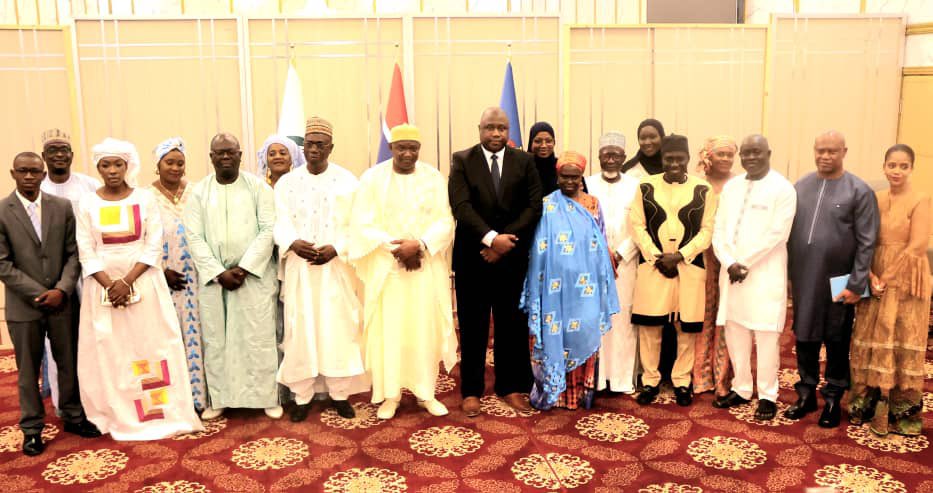Gambiaj.com – (BANJUL, The Gambia) – In a landmark moment for The Gambia’s transitional justice process, seven commissioners were officially sworn in on Friday, April 11, 2025, to lead the newly established Victims Reparations Commission. The historic ceremony, held at the State House in Banjul, was presided over by President Adama Barrow, who described the event as a significant step toward national healing and justice.
President Barrow emphasized the vital role the Commission will play in addressing the legacy of human rights abuses committed during the 22-year rule of former President Yahya Jammeh, from 1994 to 2017. He reiterated his government’s commitment to fulfilling reparations obligations and underscored the moral and legal imperative of compensating victims.
“Reparation remains one of my government’s highest priorities under the transitional justice program,” Barrow said. “We strongly believe that it is a moral and legal obligation, grounded in the principles of justice and fairness.”
He acknowledged the long wait victims and survivors have endured since the end of the former regime and affirmed that his administration would continue to uphold international legal standards in its efforts to provide redress.
The establishment of the Reparations Commission follows the work of the Truth, Reconciliation, and Reparations Commission (TRRC), which was tasked with investigating crimes committed under Jammeh’s regime. Between 2019 and 2021, the TRRC heard testimony from over 390 witnesses—many of them survivors of torture, arbitrary detention, sexual violence, and enforced disappearances.
The TRRC’s final report confirmed widespread and systematic human rights violations and recommended reparations as a cornerstone of justice and reconciliation.
Led by Dr. Badara Loum, the Reparations Commission will be responsible for designing and implementing a comprehensive reparations program. According to the Ministry of Justice’s Post-TRRC Unit, one of its first tasks will be to create a national database of victims, which will underpin both financial and non-financial forms of redress.
The government has pledged to contribute annual funding to the Reparations Fund and to support the Commission in mobilizing additional resources, both locally and internationally. While the Commission will operate independently, President Barrow assured the commissioners of his full support and called on them to pursue their work with dedication and integrity.
“This initiative is central to our goal of national healing,” Barrow said. “We cannot move forward as a nation without addressing the wounds of the past.”
He noted that the reparations program is not merely about financial compensation but also about restoring dignity, recognizing suffering, and preventing future abuses. Its implementation is seen as a key part of The Gambia’s efforts to promote accountability, strengthen rule of law, and foster national unity.
The legal foundation for the Commission’s work is provided by the Victims Reparations Act, which grants it the powers and independence required to execute its mandate, while also ensuring transparency and accountability to the Gambian people.
As the newly appointed commissioners begin their work, expectations are high that the Commission will bring long-awaited justice to victims and contribute to a more just and peaceful future.
Closing the ceremony, President Barrow expressed a profound hope: “May future generations of Gambians never again have to witness the establishment of truth or reparations commissions. Let this be the beginning of lasting peace and justice in our nation.”










